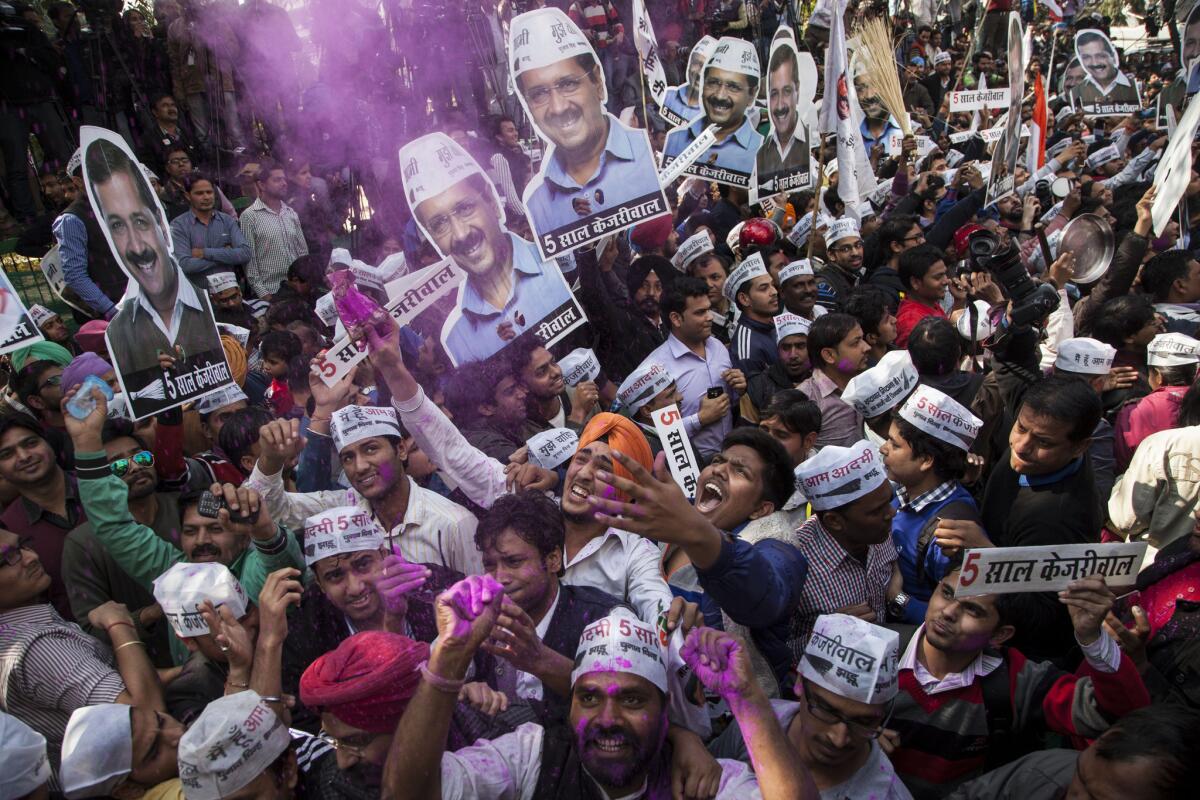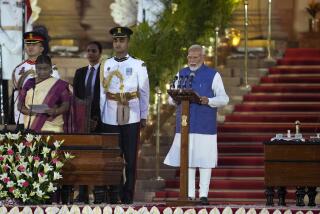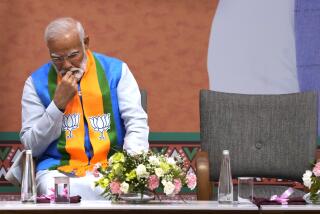In blow to Modi, anti-corruption party wins key India election by landslide

- Share via
Reporting from Mumbai, India — An upstart anti-corruption party swept to a landslide victory Tuesday in state elections in the Indian capital, dealing the first significant political setback to Prime Minister Narendra Modi.
The opposition Aam Aadmi Party, whose name means “common man,” won a record-high 67 of 70 seats in the New Delhi state government, according to official tallies -- a stunning result in a race that Modi’s Bharatiya Janata Party until recent days had thought was neck-and-neck.
The outcome signaled that voters in fast-growing New Delhi, which has catapulted past Mumbai to become India’s most populous city and the second-biggest in the world, have not bought into Modi’s mantra of economic change after nearly nine months in office. New Delhi is home not only to India’s political elite but to a massive struggling underclass that has chafed under corruption by establishment parties.
It also represented a sharp turnaround for the Aam Aadmi Party, which won control of the Delhi state government a year ago but gave it up after 49 tumultuous days in which chief executive and party boss Arvind Kejriwal led mass sit-ins that snarled traffic in the heart of the capital.
Kejriwal’s resignation as Delhi’s chief executive last February, which prompted these elections, led many Indian elites to snigger that he and his party were not ready for the spotlight in a country long dominated by two major national parties and a collection of powerful regional groups.
But Kejriwal retained substantial support, particularly among working-class voters who praised him for eliminating petty bribery and other daily indignities during his short time in power, and grass-roots party volunteers who reportedly traveled on their own dime from other cities to help in the campaign.
The former tax inspector was poised to regain the post of Delhi’s chief executive.
“When you walk on the path of truth, all the power of the universe is behind you,” Kejriwal told a crowd of supporters in Delhi on Tuesday, while admitting surprise at the scope of his victory.
“The mandate is a bit scary,” he said. “We must not become arrogant.”
Modi, who called Kejriwal a “naxal” during the campaign, a reference to a long-running Indian insurgent group, congratulated him in a phone call and pledged the support of the national government.
It ended a long political win streak for Modi, whose party won a majority in national elections last May and then rattled off a string of victories and historically strong finishes in state elections nationwide. Modi has also been buoyed by an improving Indian economy, which posted 7.5% growth in 2014, according to official statistics published this week, and warming relations with the United States and other world powers.
But a little more than one year after winning 32 seats in the Delhi state government, Modi’s party managed just three seats when final results were announced Tuesday. The other major national party, the badly weakened Indian National Congress, did not win any seats as experts said its onetime supporters flocked to the Aam Aadmi Party
Some analysts said voters were scared off by the prominence of right-wing elements within Modi’s party, known as the BJP, who have ties to Hindu radical groups. During the election campaign, five churches in the Delhi area were severely vandalized, while the largely Muslim Trilokpuri region saw an outbreak of communal violence that some believed was a tactic to win Hindus over to the BJP.
“The nasty things said by the Cabinet ministers of the BJP and the fringe elements, and more importantly the silence of top leadership on these issues, must have put off the electorate,” Aakar Patel, a columnist for the Mint newspaper who has been critical of Modi, said in an interview.
Parth M.N. is a special correspondent.
More to Read
Sign up for Essential California
The most important California stories and recommendations in your inbox every morning.
You may occasionally receive promotional content from the Los Angeles Times.














